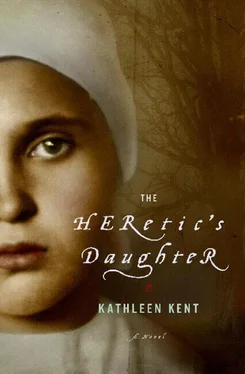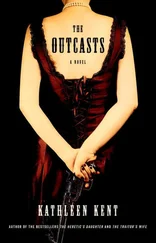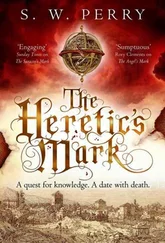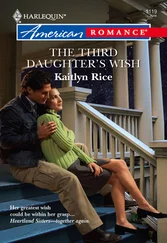I grabbed her hand and asked again, “Margaret, who did you see yesterday?”
“Why, I saw Aunt Martha. She came into the cell while you were sleeping. She was quite sorry you have been ill and will be all the more sad if you do not mend. I asked her to stay but she would not. D’ye know what she told me to tell you?”
I shook my head, my eyes huge and staring, my bowels turning to water. She cocked her head and her gaze became suddenly clear and reflective.
“She said, ‘Hold fast the stone…’”
I shut my eyes and remembered the touch of my mother’s hand as she closed my fingers around the stone I had carried from Preston’s farm. How Margaret could have known about it I cannot say. I could have, in the tossing of my fevered brain, spoken of it to her. Or perhaps the thread of knowingness had been passed to her as well and her tangled mind had caught some bit of message from the shaded world like a moth caught in a net. Margaret had resumed plaiting my hair and she sang a little song I had heard Aunt sing as she moved about the hearth. It was one that my own mother had hummed when she was unguarded and thought herself to be alone, and I wept again, not from the press of my guilt but from the easing of it. And from that moment on I began to get better.
ON A DAY close to the end of September, the door was opened by the sheriff and a tall, stately man in a flowing cape and large-brimmed hat walked into the cells and stood looking over us. He entered with a prim disdain, bringing the edge of his cloak up to cover his mouth and nose from the stench. He resisted the movement of his legs backwards and planted his feet as though enduring gale winds. The play of emotions upon his face, though, was remarkable and would stay with me through all my life. It was as though he held up to us the mirrored image of our slide from decent modesty, grace, and dignity to the degeneracy of fear and self-recrimination and sickness. His features, which were large, quivered and melted like wax held too close to the heat. His eyes, at first narrowed in righteous condemnation to view so many accused witches, widened and brimmed over with tears, which he dashed away as though they scalded his skin. His lips, pressed tightly together, a cage against speaking idly of profane things, opened to a sharp intake of breath. He put his fist up and covered the quivering mouth that muttered over and over again “My God, my God, my God…” There were no entreaties or pleas of mercy from the women. There were no moans of distress or even tears. They sat or lay mute, letting their bodies be the book of revelation.
Increase Mather, famed clergyman, friend to the King and the Governor alike, would work from that moment to cast doubt upon the accusers, and though he would never find fault outright with the judges or his son, Cotton Mather, this doubt would be a mighty blow to the Court of Oyer and Terminer. He would return again to the prison on October 19th to take statements from women who said they had been pressed into giving false witness against themselves, but I would not be in Salem to see him.
On Saturday, the first day of October, Dr. Ames came into our cell and told us that our bail had been collected and that within a very short time many of the youngest prisoners would be released. Coins had been raised from the towns of Andover and Boston and even faraway Gloucester. It gave proof, he said, that people’s minds were changing in their belief in the Salem Court. Early on the morning of the 6th of October, the sheriff opened the door to let in the blacksmith. He stood in the corridor while our chains were removed to give us time to say our farewells and to walk from our cell as best we could. I was released with my three brothers, along with fourteen other children. Abigail Dane Faulkner’s two daughters were freed, along with Moses Tyler’s nieces. Mary Lacey, Mercy Williams’ friend, who had been one of the first to cry out against my mother, was so weak from her confinement that she had to be carried from her place in the straw. Mercy Wardwell, whose father, Samuel, had been hanged on September 22nd, had turned nineteen just three days before and so was no longer a child. She hid her face in her hands and would not say good-bye to us as we left her under the cold autumn drafts from the high western wall. Behind us we left sisters and mothers and grandmothers who had no promise or even hope of release.
Lydia Dustin pressed my face in her hands and blessed me, saying, “This be but a dark dream. Now you can waken and stay with the living.” Both she and her granddaughter would spend the whole of the winter in chains. The court would find them not guilty on the 1st day of February, but because they could not pay the prison fees, they would be returned to prison. On March 2nd Elizabeth Colson would be released and returned to Reading. On March 10th, 1693, Lydia Dustin would die, one of the few remaining women left in the “good” cell of Salem prison.
I rejoiced at our freedom until it was made known to me that only the children of Andover were to be released. The children of Salem and Beverly and Billerica were to remain. Margaret was returned to her mother’s side, and as Richard carried me from the cell, she stretched her arm out to me, her fingers grasping the little piece of pottery I had given her. She held it out to me like a talisman against loss or as a promise that there would always be a connection between us that would hold tight beyond the crossing of dark and dangerous days. And as I was carried up the stairs I heard her voice calling to me, distant and metaled, as though calling from the bottom of a covered well, “Sarah, Sarah, Sarah…” I could hear her calling to me even after the door to the stairwell had been bolted fast again.
THE LEAVES OF autumn that October of 1692 were gold and red like the blood of martyrs and so suffused with color that it assaulted our prison-blind eyes like a fiery rod. We stood blinking and cringing at the outer door, not knowing whether to go forward or turn back, too weak at first to descend the few steps into the prison yard on our own. My brothers and I were the last to stand at the door and slowly, slowly, we could see, appearing through the sharp light, figures standing motionless in the prison yard.
A silent crowd had gathered around the steps, silent save for the few desperate greetings from families calling out to their children standing in front of us. One by one the children were reclaimed and dragged or carried away until we were the last four to stand wavering in the lifting wind. I was held upright between Richard and Tom and it was Andrew who walked first down the steps, still holding his injured arm close to his chest. The crowd had pressed in closer around us and I could see more clearly now what was in their faces. Pity and perhaps some portion of compassion, but withal, under every play of emotion was fear. Fear that perhaps the children of a woman hanged for a witch might yet still carry the seeds of devilry within them. It was Andrew, simple, tortured Andrew, who with the back of his knuckled fist gently pushed back the crowds, saying, “Go to home, then. Go to home.”
When he had pushed them back far enough, we saw Father moving his way to us, his head rising above the tallest of them, his face shadowed from the brim of his hat. He placed himself in front of the townspeople and waited for us to come down the steps. He did not come to our aid or rise to greet us but waited for us to make our way down by ourselves. And when we at last descended the final step, he turned, and the rustling crowd parted raggedly, like crested waves before the prow of a ship, making a space for us to walk. I understood at that moment fully and suddenly why he would not carry me, and why he had not come to my defense in times past when I was battling for my place in the world. It was not because he failed to love me, but because he loved me so well. He had brought us food and clothing and kind words when we were imprisoned; he did not abandon us. But he would never seek to weaken me so that I could not withstand the burdens and cruelties or harsh judgments of the world. An infant must learn to walk only by cutting his lip on the harsh ground. Only by tasting blood is the toddler discouraged from falling.
Читать дальше












